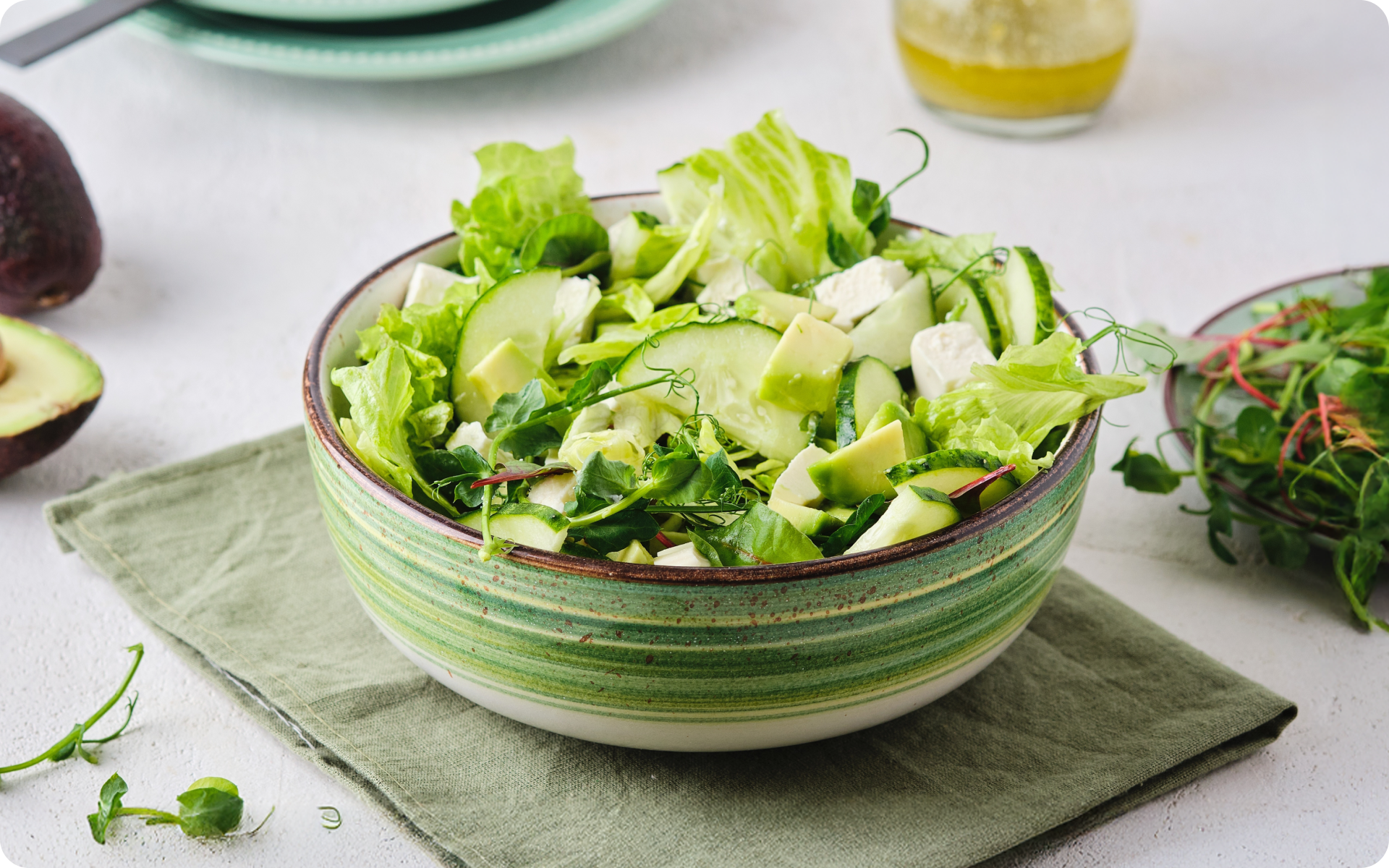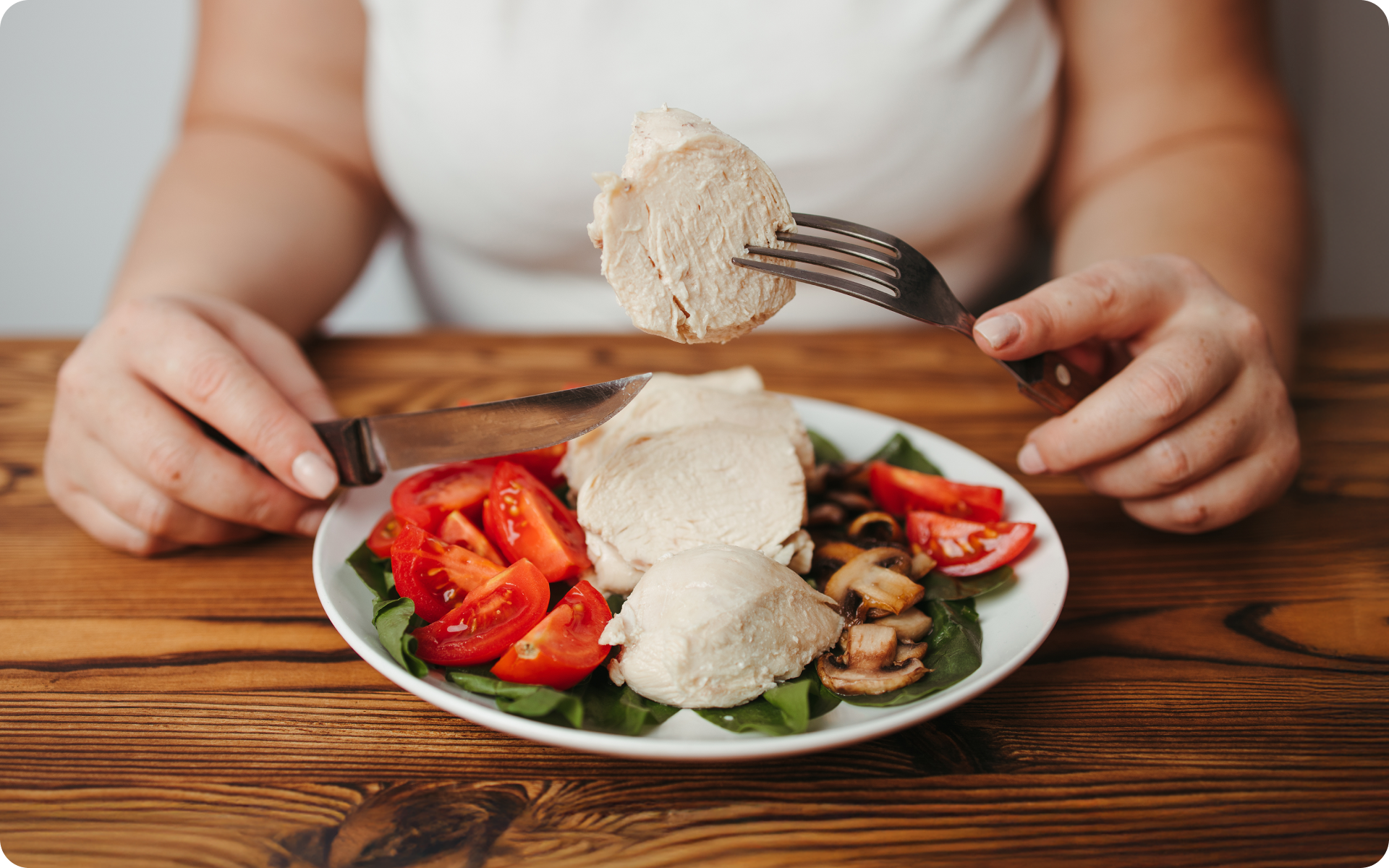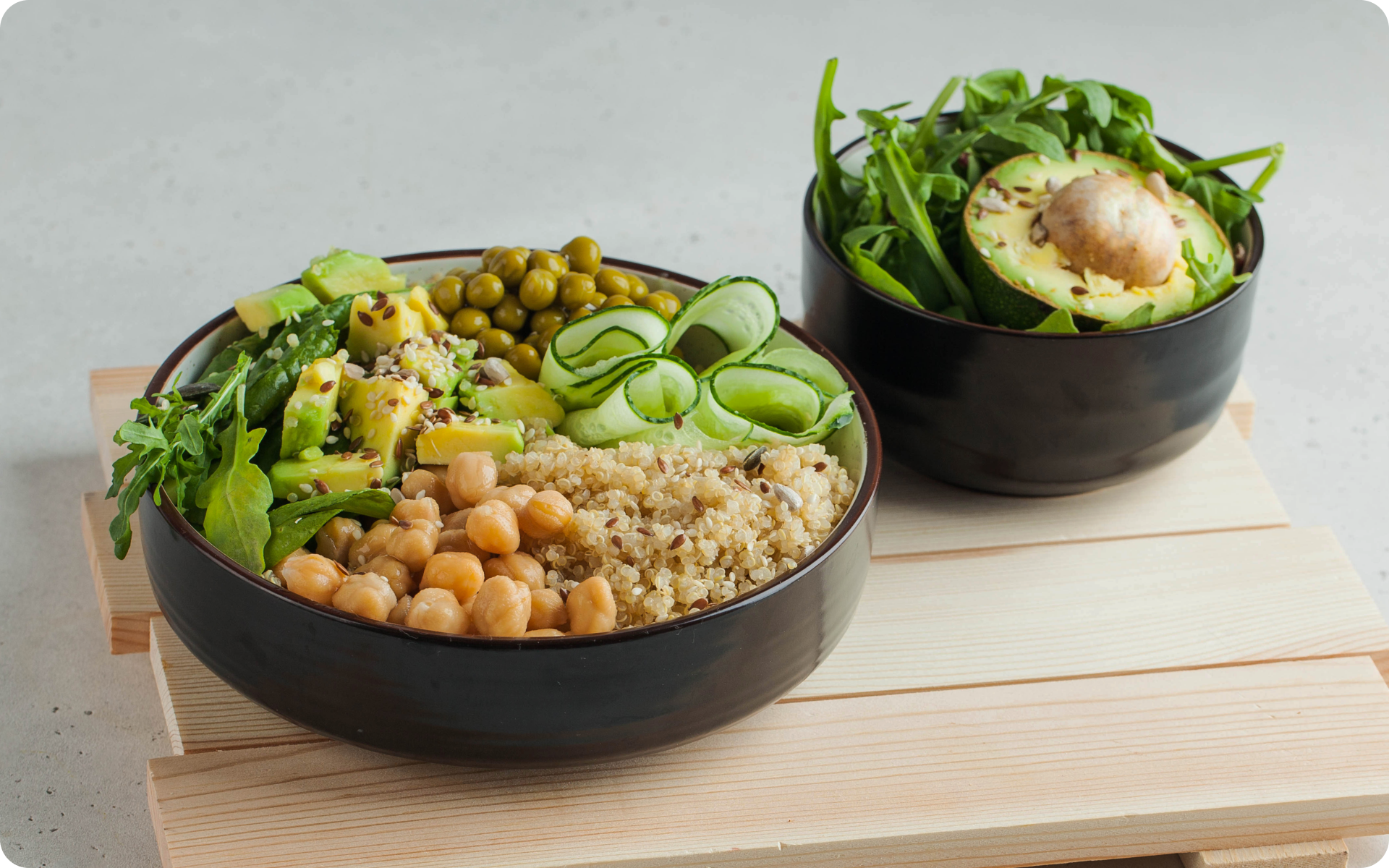Mindful eating is a term that has quickly become quite popular in the fitness and weight loss community when discussing how to improve your eating habits to help achieve your goals. While you may think that this is a new concept, mindful eating has been around for quite a while and its benefits go further than just help you shed those extra pounds.
If you are looking for more details on this practice then this article is for you. Here you shall find answers to some popular questions regarding this topic such as ‘how do you define mindful eating‘, how to create a mindful eating plan and actually follow through with it’, ‘how to track mindful eating’, and so much more.
What Is Mindful Eating?
A simple mindful eating definition is the act of always being aware of the food and drink you put into your body by observing how the food makes you feel and the signals your body sends about taste, satisfaction, and fullness.
While mindful eating seems like a new age term, its roots can be traced to Zen Buddhism and the practice of mindfulness. Mindfulness can be defined as the practice of focusing on, observing and taking note of your thoughts, feelings, or sensations without judgment. In doing this one is able to later change his or her behaviours for the better. Using this line of thought we can then see mindful eating as a way to encourage a greater awareness of our eating experiences (5).
Read More: Mindful Eating Exercise: Getting On Track To Food Awareness
Mindful Eating Weight Loss: Can Intuitive Eating Help You Shed Those Extra Pounds?
Yes, it can.
Obesity has become such a huge problem today that the World Health Organization has gone on to declare it as a global epidemic. As of the year 2000, the organization had declared that over 300 million people were obese and that about 115 million of these were suffering from obesity-related problems (4).
As the years have passed the number of overweight and obese people has steadily increased (9):
- In 2016, WHO estimated that 1.9 billion adults(18 years and older were overweight while about 650 million adults were obese.
- In the same year, their estimations showed that over 340 million children and adolescents aged 5-19 were overweight or obese.
- Just two years ago (2019) the number of overweight children (under 5 years old) had gotten up to 38 million.
If you are among these billions of people who are either overweight or obese and you are looking for a way to get your weight under control, research has shown that mindful eating can help you achieve this:
- In one research study in 2011, 47 overweight and obese men and women were divided into two groups with one group receiving an education on the effects of a mindfulness program for stress eating.
After a 4-month study period, researchers found that the men and women in the mindfulness program had signs of reduced stress, lower levels of cortisol in their blood, and had even managed to reduce weight and abdominal fat (7).
- In 2010, a pilot study seeking to find out the effects of mindful eating and living on obesity enrolled 10 obese men into the study. Each participant had 6-weekly 2-hour sessions to teach them about mindfulness meditation, mindful eating, as well as group discussions, with emphasis on awareness of body sensations, emotions, and triggers to overeat.
After the first six weeks, researchers found that the men had lost a significant amount of weight and even 3 months later the same men continued to lose weight and improve other areas of their lives. At the end of the study, researchers found that not only had the men reduced their weight but issues such as internal disinhibition (emotional eating), stress and binge eating had reduced too (10).
- In another study in 2012, researchers sought to look into the effects of an acceptance-based behavioral intervention for weight loss among overweight and obese persons. This study was especially geared towards people who often have a tendency to eat as a response to emotions and thoughts.
The participants were supposed to finish the 6-month program and then come in after 3 months for a follow-up on their progress. At the end of each milestone step (6 months and 3 months after this) the researchers found that not only did the participants experience greater weight loss results than ever before, but instances of emotional overeating had significantly reduced across the board in the group (3).
- Binge eating and emotional eating are two factors that are connected with weight gain. According to a 2014 review, mindfulness meditation – which can include mindful eating – can effectively decrease these factors and that may just lead to weight loss (8).
Want to build an attention-grabbing bubble butt, blast away fat that’s stored in all the wrong places, spring-clean your diet, turn back the clock on your skin, skyrocket your self-confidence and shatter your insecurities? Check out the BetterMe app and set this plan in motion!
How To Practice Mindful Eating?
If you are planning to incorporate this practice in your life – whether to help you eat healthier, lose weight or both – here are some mindful eating tips to help you get started (1, 2):
- Eat something before going to the grocery store. There’s nothing worse than going shopping hungry. If you do this, you increase your chances of buying more unhealthy foods and even forgetting what you need altogether.
- Always make a shopping list and stick to it. If you are using this practice to help you eat healthier, then a shopping list should be your best friend. This list helps you remember what you need and can keep you from impulsive buying any unhealthy foods that you do not need.
- Eat when you are hungry. Do not skip meals as when you do this, you risk extreme hunger which can lead you to make some poor food choices and will not allow you the opportunity to savour your meal.
- Eat slowly. This ties in with the point about. When you are ravenous, you tend to basically inhale your food and not taste anything you are consuming. Mindful eating calls for you to eat slowly so as to properly enjoy and appreciate your food.
- Always reflect as you eat. Take time to take note of your emotions during your meals. Do not be detached but rather always be present and at the moment during meal times.
- Sit down and remove all distractions. Do not eat on the go as you will not enjoy your meal. If you can take away all distractions as well. Distractions can include things like a book, social media, television, a radio program or podcast, etc.
- Always eat from a plate. Controlling your portions is a big deal in weight loss and it matters in mindful eating too. When you place food on a plate, you are less likely to overeat.
- Incorporate gratitude meditation while eating. Before your food lands on your plate, it has gone through many hands and processes before it got to you. Always take time to appreciate this and the many people who made it possible for you to get the meal in hand.
- Chew slowly and for longer. This helps you appreciate the taste and texture of your meal.
- Take note of how the food makes you feel. Food is not just about taste and texture alone. It also invokes emotions in us. Some bring us a sense of comfort, others make us feel super healthy, others nauseated, while others can make us feel guilty. Take note of how each meal or snack leaves you feeling.
- Stop eating once you are full – even if your plate is not empty. Remember that you do not always have to leave an empty plate at the table. If you feel full, put your fork or spoon down and push the plate away.
If you are worried about food waste, please note that we are not encouraging this. You can always carry your leftovers home, or to the fridge and enjoy them the next day.
Read More: Mindfulness Tips: Practical Ways To Improve Your Awareness And Bring Balance To Daily Life
A Simple Mindful Eating Exercise To Try At Home
The approach to mindful eating, like meditation, is different for everyone and so the example below is just a simple guideline for a beginner to this technique. Feel free to change it up as you get used to doing it and if you already have some established mindful eating techniques that work for you then by all means continue doing them.
We shall be using a grape for this exercise but you can use any other foods or fruits that you currently have at hand – the smaller the piece of food, the better. Great options include a date, a strawberry, a cherry tomato, an almond, etc.
Please note that this exercise is best done when you start feeling hungry or peckish:
- Take away any distractions from you. This can be done by pausing any music that is playing, muting, switching off, or even turning away from your TV, etc.
- Place one grape in a small plate or bowl and take it to the table where you normally eat.
- Once you are here, place the grape in your hand and pause to take notice of it. How much does it weigh in your hand? What colour is the grape? Does it feel cold or is it at room temperature? Does it have any indentations in it? Is it on a stem? Does it feel as hard as grapes often do or has it started getting softer?
- Once you have answers to this and the grape seems edible, do not eat it just yet but pause again and take notice of how you feel – Are you salivating from the anticipation? Are you hungry or do you feel like having a snack? Is the want to eat from actual hunger or because you are trying to cover another feeling? If it’s another feeling, what feeling is it? Are you sad, lonely, happy, or just bored and looking for something to do?
- Take a moment to think about all those other times that you eat – Do you often eat when you fight off heightened emotions? What kinds of foods do you often reach for in such times? Is this an automatic thing or do you sometimes consider your options of what to eat?
- Once this is done take the grape and place it in your mouth, pause and see how it feels in your mouth and on your tongue then take one bite of the small fruit. Notice the flavour of it? What does it taste like? Does the taste remind you of anything?
- Notice how your body automatically tries to swallow the juices. How your tongue moves around in your mouth and how your jaws automatically want to continue the chewing motion.
- Once you take all this in stock, go ahead and chew then swallow the grape. Then pause again. Do you want another grape now?
These are just some of the questions that you can ask yourself as a part of the mindful eating exercise. While it is not a must, we recommend having a notebook or journal by your side so you can write down answers to all the questions above, or any other that you may ponder upon during this short exercise.
Remember that mindful eating is a simple exercise that helps us appreciate our food – the texture, colours, and even the beauty of it even more. It is also a simple form of meditation that can help center us by turning off auto-pilot thinking and eating to be present and in the moment and savour the meal in front of us.
How To Track Mindful Eating?
When trying to lose weight, tracking your daily food energy intake using a calorie counting app is the best way to go about it. The same thing applies to mindful eating. While you could try using a journal or a mindful eating worksheet, using an app makes the process so much easier and convenient. You can find such apps on the Apple Store or Google Play – depending on your device.
A point to note is that not all apps are the same and some do not have all the information needed for this issue. According to a 2019 study on mindful eating mobile health apps, researchers found that most of these mindful eating tracking apps are centered on eating timers, diaries, or hunger rating scales. They tend to not offer enough information regarding guided meditations on the matter, tell you how to eat, or even mindful eating training (6). So feel free to try out a few in order to find the one that is most helpful for you.
The Bottom Line
Mindful eating may seem like a new age thing that pop culture is trying to push but in truth, the practice has been around for many decades and has been used by millions for several reasons. If you are looking for a better and healthier way to eat or even be in tune with everything around you, put your skepticism down for a minute and try mindful eating. You may just be surprised at its effectiveness.
Get your personalized
meal plan!
DISCLAIMER:
This article is intended for general informational purposes only and does not address individual circumstances. It is not a substitute for professional advice or help and should not be relied on to make decisions of any kind. A licensed physician should be consulted for diagnosis and treatment of any medical conditions. Any action you take upon the information presented in this article is strictly at your own risk and responsibility!
SOURCES:
- 8 steps to mindful eating (2016, health.harvard.edu)
- 10 tips for mindful eating — just in time for the holidays (2015, health.harvard.edu)
- An acceptance-based behavioral intervention for weight loss: a pilot study (2012, pubmed.ncbi.nlm.nih.gov)
- Controlling the global obesity epidemic (n.d., who.int)
- Mindful Eating: The Art of Presence While You Eat (2017, ncbi.nlm.nih.gov)
- Mindful Eating Mobile Health Apps: Review and Appraisal (2019, ncbi.nlm.nih.gov)
- Mindfulness Intervention for Stress Eating to Reduce Cortisol and Abdominal Fat among Overweight and Obese Women: An Exploratory Randomized Controlled Study (2011, pubmed.ncbi.nlm.nih.gov)
- Mindfulness meditation as an intervention for binge eating, emotional eating, and weight loss: a systematic review (2014, pubmed.ncbi.nlm.nih.gov)
- Obesity and overweight (2020, who.int)
- Pilot study: Mindful Eating and Living (MEAL): weight, eating behavior, and psychological outcomes associated with a mindfulness-based intervention for people with obesity (2010, pubmed.ncbi.nlm.nih.gov)














